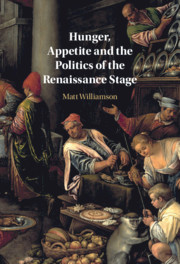Book contents
- Hunger, Appetite and the Politics of the Renaissance Stage
- Hunger, Appetite and the Politics of the Renaissance Stage
- Copyright page
- Contents
- Acknowledgements
- Introduction
- Chapter 1 Thinking through Hunger and Appetite in Renaissance England
- Chapter 2 Service
- Chapter 3 The Food Gift
- Chapter 4 Sexual Desire
- Chapter 5 Female Food Refusal
- Chapter 6 Imperial Appetites
- Chapter 7 Revolt
- Conclusion
- Bibliography
- Index
Chapter 6 - Imperial Appetites
Published online by Cambridge University Press: 28 May 2021
- Hunger, Appetite and the Politics of the Renaissance Stage
- Hunger, Appetite and the Politics of the Renaissance Stage
- Copyright page
- Contents
- Acknowledgements
- Introduction
- Chapter 1 Thinking through Hunger and Appetite in Renaissance England
- Chapter 2 Service
- Chapter 3 The Food Gift
- Chapter 4 Sexual Desire
- Chapter 5 Female Food Refusal
- Chapter 6 Imperial Appetites
- Chapter 7 Revolt
- Conclusion
- Bibliography
- Index
Summary
Chapter 6 considers the depiction of hunger, appetite and imperialism. Food comprised an integral component of colonial discourse in the period, and the representation of hunger and appetite therefore provided a significant means by which the theatres could legitimise or critique England’s overseas expansion. The chapter focuses on the use of hunger and appetite as a means to critique or endorse emergent bourgeois ideologies of imperialist expansion, with an emphasis on how colonial adventures are constructed as both a solution to the problem of hunger and the object of new and occasionally unnatural appetites. It considers the cultural significance of cannibalism as an act which at this time was associated not only with subaltern native populations, but also with the expansive appetites of European colonisers, in a manner which could be deployed to express anxiety at the potential consequences of imperial expansion.
- Type
- Chapter
- Information
- Hunger, Appetite and the Politics of the Renaissance Stage , pp. 149 - 171Publisher: Cambridge University PressPrint publication year: 2021

